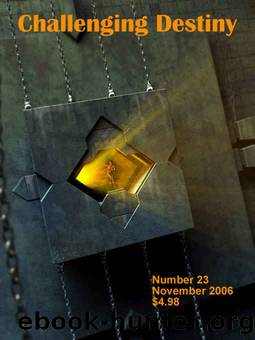Issue 23 by Challenging Destiny Magazine

Author:Challenging Destiny Magazine [Magazine, Challenging Destiny]
Language: eng
Format: epub
Published: 2006-11-30T22:58:10+00:00
James Tiptree Jr. and the Tiptree Awards by James Schellenberg
James Tiptree, Jr.: The Double Life of Alice B. Sheldon, Julie Phillips, St. Martin's, 2006, 469 pp.
Writing a biography of a writer is a tricky thing. A professional writer will have produced hundreds of thousands or even millions of words, both as sold to publications as well as in letters to other people. Such a mountain of fictional words can be daunting to analyse. In addition, most writers have some amount of self-awareness, and will be busy analysing their own lives and their own work; it's very tempting to piggyback on this, to the possible detriment of original analysis. The life of James Tiptree, Jr.âwith an overwhelming amount of public and private wordageâis therefore not an unusual challenge for the biography of a writer, but it's still a challenge.
I've also noticed that biography, in general, can be a tricky thing. Does a life wrap up into neat little packages, complete with a message and a narrative trajectory? Possibly, but those would be the atypical cases. Narrative is tempting, though, since it's an old and venerable human impulse. The alternativeâto present a shapeless mass of anecdote, arranged chronologicallyâsimply isn't appealing. It's like a minefield, with no ideal choice in sight.
So we come to the biography of Alice B. Sheldon, a woman who lived a long and unusual life, gaining the most fame for herself in the guise of a man writing science fiction. Since her career as Tiptree only started in her mid-50sâthe late 1960sâthere is a lot of material to cover before the point which most people know. Was her life a simple line leading directly to the Tiptree moment? A narrative that concludes logically and/or inevitably with a manly pseudonym for a woman?
Perhaps. And in some ways, that's how Phillips presents Sheldon's early life. I was a bit alarmed at this ânarrativeâ strategy, since I'm a bit nervous about reading an author's life through their writing. There will always be personal things in an author's work, since if nothing impinged from private life into the fictional sphere then everyone's writing would be identicalâthere has to be something unique in a book or story, or else why read it! But there's a reason why it's called fiction: writers who know what they're doing can filter their personal life, twist it around, make surprising connections, contemplate the darker aspects, and generally play with it as brutally or as sentimentally as necessary. Life events can be fodder, but fiction does not equal autobiography. Even if it comes anywhere close, it's like one of those stories told in the first-person with an unreliable narrator. You have to spend most of your time deciphering what is really going on.
All that said, I came to agree that Phillipsâ strategy works, in this particular case. That's because Sheldon only started writing as Tiptree late in life, and then didn't write anything of equal power once her pseudonym was uncovered only a few years later. Clearly there were
Download
This site does not store any files on its server. We only index and link to content provided by other sites. Please contact the content providers to delete copyright contents if any and email us, we'll remove relevant links or contents immediately.
| Coloring Books for Grown-Ups | Humor |
| Movies | Performing Arts |
| Pop Culture | Puzzles & Games |
| Radio | Sheet Music & Scores |
| Television | Trivia & Fun Facts |
The Infinite Retina by Robert Scoble Irena Cronin(6241)
Harry Potter and the Cursed Child: The Journey by Harry Potter Theatrical Productions(4491)
The Sports Rules Book by Human Kinetics(4379)
Molly's Game: From Hollywood's Elite to Wall Street's Billionaire Boys Club, My High-Stakes Adventure in the World of Underground Poker by Molly Bloom(3529)
A Knight of the Seven Kingdoms by George R R Martin(3324)
How To by Randall Munroe(3105)
Quidditch Through the Ages by J.K. Rowling(3100)
Flowers For Algernon by Daniel Keyes(3099)
Quidditch Through the Ages by J K Rowling & Kennilworthy Whisp(2966)
Stacked Decks by The Rotenberg Collection(2880)
Quidditch Through the Ages by Kennilworthy Whisp by J.K. Rowling(2858)
Quidditch through the Ages by J. K. Rowling(2792)
776 Stupidest Things Ever Said by Ross Petras(2775)
Quidditch Through The Ages by J. K. Rowling(2761)
Ready Player One: A Novel by Ernest Cline(2717)
What If?: Serious Scientific Answers to Absurd Hypothetical Questions by Randall Munroe(2700)
Beautiful Oblivion by Jamie McGuire(2602)
The Book of Questions: Revised and Updated by Gregory Stock Ph.d(2562)
Champions of Illusion by Susana Martinez-Conde & Stephen Macknik(2444)
